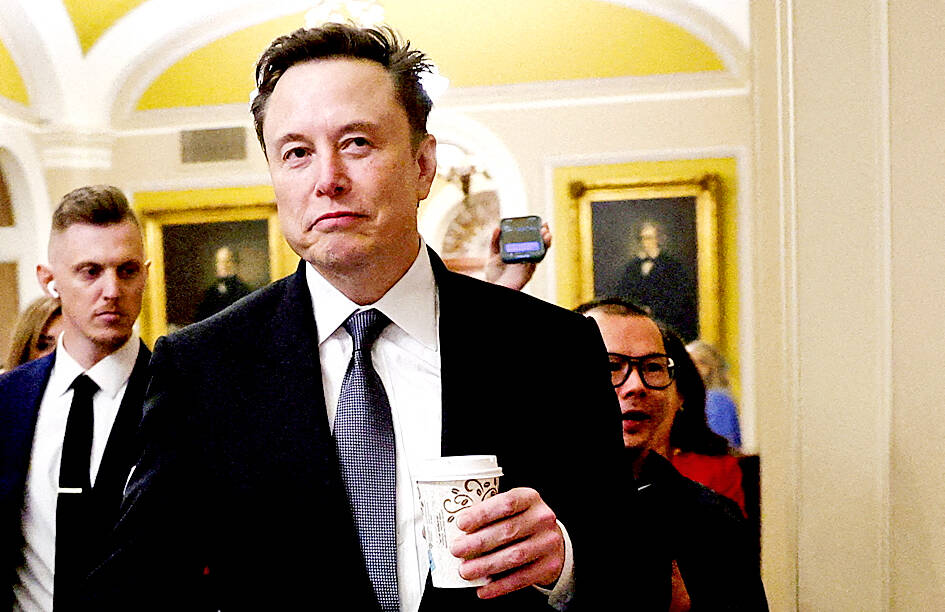Billionaire Elon Musk said that he was not interested in purchasing TikTok, the popular short-video app that the US has been trying to ban over national security concerns with its Chinese owner ByteDance Ltd (字節跳動).
Musk’s comments, made late last month, were released online on Saturday by The WELT Group, a part of the German media company Axel Springer SE, which hosted a summit which the Tesla Inc chief joined via video.
“I have not put in a bid for TikTok,” Musk said a week after US President Donald Trump said he was open to Musk buying the ByteDance-owned app if he wanted to do so.

Photo: Reuters
“I don’t have any plans for what I would do if I had TikTok,” Musk said, adding that he does not use the short video app personally and was not familiar with the app’s format.
“I’m not chomping at the bit to acquire TikTok, I do not acquire companies in general, it’s quite rare,” Musk said, adding that his billion-dollar acquisition of social media platform Twitter, now called X, was unusual.
“I usually build companies from scratch,” Musk said.
Trump signed an executive order seeking to delay the enforcement of a ban on the popular short-video app that was slated to be shuttered on Jan. 19.
ByteDance was given the January deadline to sell the US assets of TikTok or face a US ban, following US lawmakers’ concerns that the app poses national security risks, because China could compel the company to share the data of its US users.
TikTok has denied that it has or ever would share US user data.
Apple Inc and Google have not reinstated TikTok to their app stores since a US law took effect.
TikTok on Friday said that it was allowing US Android users to download and connect to the app through package kits on its Web site to circumvent restrictions on the popular platform in the country.
Trump has said that he was in talks with multiple people over TikTok’s purchase and would likely have a decision on the app’s future this month. It has about 170 million US users.
Last week, the US president signed an executive order to create a sovereign wealth fund within the year, saying it could potentially buy TikTok.
ByteDance has previously denied any plans to sell TikTok.

Hon Hai Precision Industry Co (鴻海精密) yesterday said that its research institute has launched its first advanced artificial intelligence (AI) large language model (LLM) using traditional Chinese, with technology assistance from Nvidia Corp. Hon Hai, also known as Foxconn Technology Group (富士康科技集團), said the LLM, FoxBrain, is expected to improve its data analysis capabilities for smart manufacturing, and electric vehicle and smart city development. An LLM is a type of AI trained on vast amounts of text data and uses deep learning techniques, particularly neural networks, to process and generate language. They are essential for building and improving AI-powered servers. Nvidia provided assistance

DOMESTIC SUPPLY: The probe comes as Donald Trump has called for the repeal of the US$52.7 billion CHIPS and Science Act, which the US Congress passed in 2022 The Office of the US Trade Representative is to hold a hearing tomorrow into older Chinese-made “legacy” semiconductors that could heap more US tariffs on chips from China that power everyday goods from cars to washing machines to telecoms equipment. The probe, which began during former US president Joe Biden’s tenure in December last year, aims to protect US and other semiconductor producers from China’s massive state-driven buildup of domestic chip supply. A 50 percent US tariff on Chinese semiconductors began on Jan. 1. Legacy chips use older manufacturing processes introduced more than a decade ago and are often far simpler than

STILL HOPEFUL: Delayed payment of NT$5.35 billion from an Indian server client sent its earnings plunging last year, but the firm expects a gradual pickup ahead Asustek Computer Inc (華碩), the world’s No. 5 PC vendor, yesterday reported an 87 percent slump in net profit for last year, dragged by a massive overdue payment from an Indian cloud service provider. The Indian customer has delayed payment totaling NT$5.35 billion (US$162.7 million), Asustek chief financial officer Nick Wu (吳長榮) told an online earnings conference. Asustek shipped servers to India between April and June last year. The customer told Asustek that it is launching multiple fundraising projects and expected to repay the debt in the short term, Wu said. The Indian customer accounted for less than 10 percent to Asustek’s

Gasoline and diesel prices this week are to decrease NT$0.5 and NT$1 per liter respectively as international crude prices continued to fall last week, CPC Corp, Taiwan (CPC, 台灣中油) and Formosa Petrochemical Corp (台塑石化) said yesterday. Effective today, gasoline prices at CPC and Formosa stations are to decrease to NT$29.2, NT$30.7 and NT$32.7 per liter for 92, 95 and 98-octane unleaded gasoline respectively, while premium diesel is to cost NT$27.9 per liter at CPC stations and NT$27.7 at Formosa pumps, the companies said in separate statements. Global crude oil prices dropped last week after the eight OPEC+ members said they would